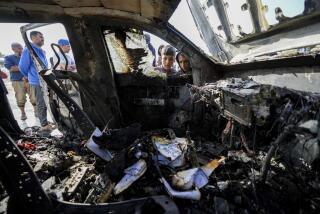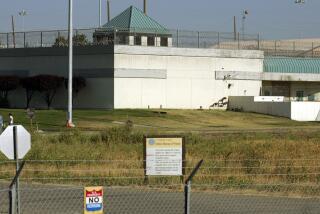Pentagon Intends to Replace Ground Commander in Iraq
WASHINGTON — Pentagon officials plan to replace the top ground commander in Iraq, Army Lt. Gen. Ricardo Sanchez, with a higher-ranking officer leading a new command structure, defense officials said Monday.
The successor is expected to be the Army’s second-in-command, Gen. George W. Casey, officials said.
Sanchez’s departure has been long foreseen, said Defense Department officials speaking on condition of anonymity. They insisted that it was unrelated to his job performance during an occupation that has faced an Iraqi insurgency and the growing scandal over the abuse of Iraqi prisoners by U.S. guards at Abu Ghraib prison.
Military officials on Sunday denied a report in the Washington Post that Sanchez had been present for some of the incidents of abuse at Abu Ghraib. However, Sanchez has drawn criticism for allowing military intelligence officials to oversee the detention of some “high-value” prisoners by military police, who usually serve under their own MP commander.
The news about Sanchez came the same day that Brig. Gen. Janis Karpinski, commander of the brigade that oversaw the guard staff at the prison, told The Times that she had received an e-mail telling her she was being suspended from duty.
Under a scenario advocated by Army Gen. John Abizaid, the head of U.S. Central Command, Sanchez, a three-star general, would be replaced by a four-star general, elevating the status of the U.S. presence in Iraq to a new regional command, defense officials said. That move would require congressional approval.
“Sanchez being replaced has been the plan forever,” one senior defense official said. “The entire time there was a plan for Multinational Forces Iraq. The plan was for Sanchez to stand it up and then turn it over to someone else.”
“He’s been there going on 14 months now,” another senior defense official said. “Anybody trying to draw a line between the natural progression of looking for somebody to rotate into that position to the alleged abuses at Abu Ghraib would be just wrong. There’s absolutely no connection whatever.”
However, when the plan for reorganizing the command structure in Iraq was initially reported in January, Abizaid told defense reporters that Sanchez would stay on to oversee the fight against the insurgency. Pentagon officials gave no reason for the change.
It was unknown what Sanchez’s next assignment would be.
Lt. Gen. Thomas Metz, now Sanchez’s second-in-command, would probably continue to oversee daily operations in the coalition’s efforts to improve security and quell a stubborn and bloody guerrilla insurgency, Pentagon insiders said.
The new command structure is designed to improve oversight of Iraq and communication between the military leadership and the civilian leadership of the occupation. The Coalition Provisional Authority, led by L. Paul Bremer III, intends to hand over sovereignty June 30 to an interim Iraqi government. The top U.S. official will then be John D. Negroponte, who was recently confirmed as ambassador. The new four-star general will work closely with Negroponte on overall political and military planning.
Defense Secretary Donald H. Rumsfeld is said by Pentagon insiders to favor Casey, who as vice chief of staff is the second-highest-ranking uniformed Army officer.
But some defense officials said he has not been named as the next leader of the U.S.-led coalition’s military forces in Iraq out of fear that it would jeopardize his chances for confirmation by a Congress that is unhappy with the Pentagon. Lawmakers are already irate over what they see as the small amount of information they have received about the Abu Ghraib scandal, so they might want more consultation before an announcement of the Pentagon’s plans, the officials said.
“I would just tell you that if we had something like that to announce, we would, and that any speculation prior to an announcement would be irresponsible,” Pentagon spokesman Bryan Whitman said.
In discussing her situation in a telephone interview from the New York area, Karpinski contended Monday that she had been “set up” by Army officials. About two months after the Red Cross warned U.S. commanders of widespread prisoner abuses, she said, Army officials had her sign a confidential letter to the Red Cross assuring that Iraqi detainees were being given the best treatment possible and that even more “improvements are continually being made.”
Karpinski’s account of the letter and the sequence of events that occurred as the Abu Ghraib scandal began to emerge contradicts those of her superiors, who have said they did not react to the abuses sooner because it took months for the reports of problems to rise to their level.
The first report of abuses at Abu Ghraib was given to Army officials by the International Committee of the Red Cross (ICRC) in November. It was not until January, after an enlisted man working as a guard at Abu Ghraib passed photographs of abuses to his superiors, that senior Army officials began to investigate.
But the letter Karpinski signed rejecting the original Red Cross allegations was written in December. And if, as she said Monday, the letter was drafted in part by advisors to Sanchez, that strongly suggests that allegations of abuses had already reached Sanchez’s headquarters.
Clearly, the Red Cross was not persuaded by the three-page letter. In February, the organization came back with a second report, a scathing account of what it called a series of “main violations” of prisoners’ rights.
Pierre Kraehenbuehl, director of operations for the ICRC, indicated on May 8, shortly after the abuse scandal became public, that his organization was not pleased with the feedback it had received from Army authorities about prison conditions.
“On a number of occasions the ICRC was assured that its findings were being taken very seriously, and that measures would be taken,” he said. “In later visits there were indications that some of the material problems had been addressed. However, more remained to be done, particularly given that we were dealing here with a broader pattern and a system, as opposed to individual acts.”
Karpinski, who was commander of the Army Reserve’s 800th Military Police Brigade, said Monday that by late December military intelligence officials were basically “running” the prison. They wanted her to sign the response letter to the Red Cross because, she said, “I had no information whatsoever why these ICRC complaints were being registered.”
She said the letter went through several drafts and was repeatedly sent back and forth between her command and Sanchez’s office of legal counsel -- an assertion borne out at a congressional hearing last week. Finally, she said, she signed the letter that was dated Dec. 24.
“I’m aware now that that response was written precisely for my signature, precisely to avoid any discussions about the allegations that the Red Cross was raising,” she said.
The letter paints a picture of a prison ostensibly free of abuses and focused on keeping detainees content -- even while guards and military interrogators were under enormous pressure because U.S. casualties from insurgents’ attacks were growing and the sprawling complex itself was hit frequently by enemy mortar fire.
“All internees are guaranteed humane treatment as a minimum standard,” the letter assured the ICRC’s prisoner protection coordinator, Eva Svoboda. It added, “We will seek to exceed this standard where possible and appropriate.”
The letter was a response to a Red Cross interim report in November after the organization made a series of inspections at Abu Ghraib and other Army detention facilities and found numerous detainees who were injured or being held naked.
It tried to assure the Red Cross that things were fine at Abu Ghraib.
But it did assert, contrary to what Defense Department officials have said, that some detainees were not entitled to the full protections of the Geneva Convention because the prison was under fire from insurgents and there was a desperate need for information from detainees.
The Red Cross visited between March and November of last year. After those trips, the inspectors documented numerous incidents of brutality, “sometimes causing death or serious injury,” as well as “excessive and disproportionate use of force ... resulting in death or injury.”
Further, the Red Cross determined that detainees were subjected to “physical or psychological coercion during interrogations” by U.S. intelligence officials.
Much of the prison abuse appears to have occurred on Tier 1A, otherwise known as the “hard site,” where inmates considered high-risk were kept. The abuse appears to have begun in early October and continued through much of the rest of last year.
Six guards are being prosecuted by the military and a seventh has pleaded guilty in return for a year in prison.
They have said they were acting at the behest of military intelligence officers when they roughed up prisoners and humiliated them in the middle of the night.
On Monday, Karpinski said she received an e-mail from the General Officer Management Office at the Pentagon, notifying her that she was being suspended and that “urgent” paperwork explaining the discipline would be sent to her home in South Carolina.
But Karpinski said she did not expect to be home for another 10 days or two weeks and could not get the Army to tell her the explanation for her suspension.
“These are people who made their careers out of saying they take care of soldiers first,” she complained. “Well, so much for that consideration.”
And she lashed out at the Army hierarchy, saying, “You’d think somebody would pick up the phone and call me. That should have been the protocol courtesy. I am a general officer. Nobody could spend the 25 cents to call me?”
More to Read
Sign up for Essential California
The most important California stories and recommendations in your inbox every morning.
You may occasionally receive promotional content from the Los Angeles Times.











